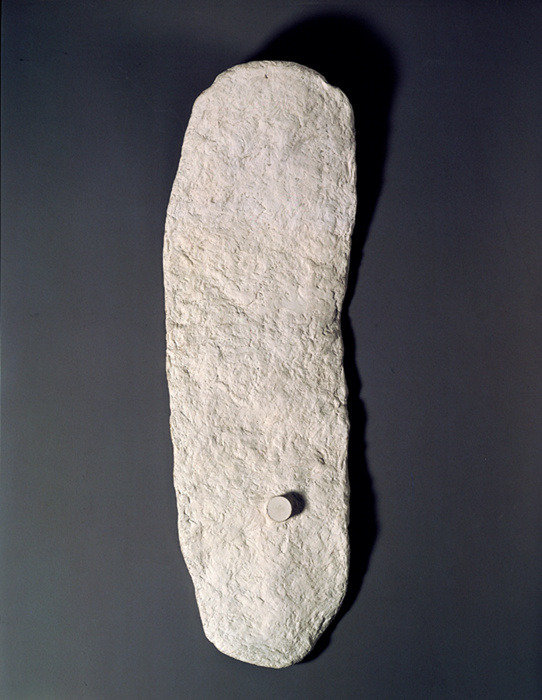Franz West
dal 9/10/2014 al 8/11/2014
Segnalato da
9/10/2014
Franz West
Hauser & Wirth Somerset, Bruton
Early Work. The exhibition comprises a series of sculptures known as 'Passstucke', or 'Adaptives', that West first produced in the 1970s. The artworks are small amorphous objects that are meant to be touched, held, manipulated and contemplated.

curated by Paul Schimmel
Hauser & Wirth Somerset is proud to present a selection of early works by the late Austrian artist Franz West. The exhibition, curated by Paul Schimmel, curator and Partner at Hauser & Wirth, comprises a series of sculptures known as ‘Passstücke’, or ‘Adaptives’, that West first produced in the 1970s.
West emerged as an artist in Vienna in the 1960s when many of his older contemporaries were exploring performance and actionist art. He attended some of the most notorious performances of the Viennese Actionists and was profoundly affected by their transgressive acts. Building on the Actionists’ use of the body and their desire to call into question viewers’ traditional engagement with art, West established his own autonomous practices. Though just as concerned with Viennese psychoanalytic thought as the Actionists, West rejected their extreme approach and took a subtler route, making sculpture that people could interact with. His work was informed by his reading of the psychoanalysis of Jacques Lacan and the philosophy of Ludwig Wittgenstein, and sought a dialogue with the viewer, analysing the nature of art, its display and the viewers’ relationship to it.
‘Passstücke’, or ‘Adaptives’, are small amorphous objects that are meant to be touched, held, manipulated and contemplated; they exist in their own unique never-world: never literal or figurative, never beautiful or ugly, never geometric or organic. West described them as ‘prostheses’, a term which suggests their biomorphic character, incompleteness and close relation to the body. Abstract in form, some are suggestive of physical human forms, yet are ambiguous enough to conjure up a range of possible gestural associations. Others are based upon a utilitarian object: clothing, bags, brooms, walking sticks or bottles, which are covered with a coat of plaster and morphed into something alien, yet vaguely recognisable. West’s sculptures are not independent, finished works, as it is only through an interaction with the viewer, either physical or intellectual, that a work finds its completion and fulfils its potential.
The humble materials of these ‘Passstücke’, typically papier-mâché or plaster with rough-finished surfaces, demonstrate West’s hands-on approach in which art is part of the everyday. The works produce diverse situations depending upon the viewer, the time and the context. In the 1980s the concept of the ‘Adaptives’ was further developed as West began to produce furniture-like pieces that also invite physical use. ‘Untitled’ (1982) is an early example of this; made of plaster and polyester and resembling a table, the uses of this piece appear more predefined – but even furniture has the opportunity to be adapted in a given scenario, influencing the viewers’ experience and perception of reality. The ‘Adaptives’ were not originally intended for exhibition and had been viewed initially just by West’s circle of friends. It was not until 1980, when they were first exhibited in Vienna, that West became more focused on their aesthetic qualities. This in turn led him to develop what he referred to as ‘legitimate sculptures’, that is, sculptures that were not intended for corporeal use, but rather to create dialogue on a visual and conceptual level.
About the Artist
Born in 1947 in Vienna, Austria, Franz West is considered one of the most influential practitioners to have emerged from the 1960s generation of Viennese Actionists. He studied at Akademie der Bildenden Künste, in Vienna, and is best known for his tactile scuptures and interactive installations with furniture. He began consolidating his particular style during the 1970s, producing the sculptures known as ‘Adaptives’ – portable works made out of ordinary materials like plaster and papier-mâché that were intended to be interacted with by the viewer. By the 1980s, West had expanded his practice to include furniture, often presented as installations, which were made in more permanent materials such as polyester and aluminium. West’s work has featured in many international group exhibitions such as Documenta and Biennales all over the world, and it is included in major public collections including Centre Pompidou, Paris, France; Museum Ludwig, Cologne, Germany; the Museum of Modern Art, New York NY; and MAXXI, Rome, Italy. A major survey of his work entitled ‘Where is My Eight?’ was on show at the Hepworth Wakefield, Yorkshire, England, earlier this year. Franz West died in Vienna in July 2012.
Opening 10th October
Hauser & Wirth Somerset
Durslade Farm, Dropping Lane-Bruton Gran Bretagna
Hours: 10 am – 5 pm (March – October)
10 am – 4 pm (November – February)



